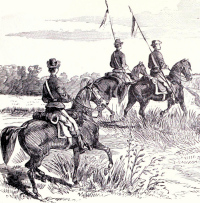California, October 8th. This morning we broke camp at six o’clock and marched at eight. The road was bad, for which the beauty of the scenery did not entirely compensate. To-day’s experience has taught us how completely an army is tied to the wheels of the wagons. Tell a general how fast the train can travel and he will know how long the journey will be. We passed our wagons in a terrible plight: some upset, some with balky mules, some stuck in the mud, and some broken down. The loud-swearing drivers, and the stubborn, patient, hard-pulling mules did not fail to vary and enliven the scene.
A journey of eighteen miles brought us to this place, where we are encamped upon the county fair-ground. California is a mean, thriftless village; there are no trees shading the cottages, no shrubbery in the yards. The place is only two or three years old, but already wears a slovenly air of decay.
I set out with Colonel L. upon a foraging expedition. We passed a small house, in front of which a fat little negro-girl was drawing a bucket of water from the well, the girl puffing and the windlass creaking.
“Will Massa have a drink of water?”
It was the first token of hospitality since Hermann. We stopped and drank from the bucket, but had not been there a minute before the mistress ran out, with suspicion in her face, to protect her property. A single question sufficed to show the politics of that house.
“Where is your husband?”
“He went off a little while ago.”
This was the Missouri way of informing us that he was in the Rebel army.
A little farther on we came to what was evidently the chief house of the place. A bevy of maidens stood at the gate, supported by a pleasant matron, fair and fat.
“Can you sell us some bread?” was our rather practical inquiry.
“We have none baked, but will bake you some by sundown,” was the answer, given in a hearty, generous voice.
The bargain was soon made. Our portly dame proved to be a Virginian, who still cherished a true Virginian love for the Union.
Fremont’s Hundred Days in Missouri was published in three installments in The Atlantic Monthly. The anonymous author appears to have been a member of Fremont’s staff with a disdainful bias towards Missourians, even those who were pro-Union.
